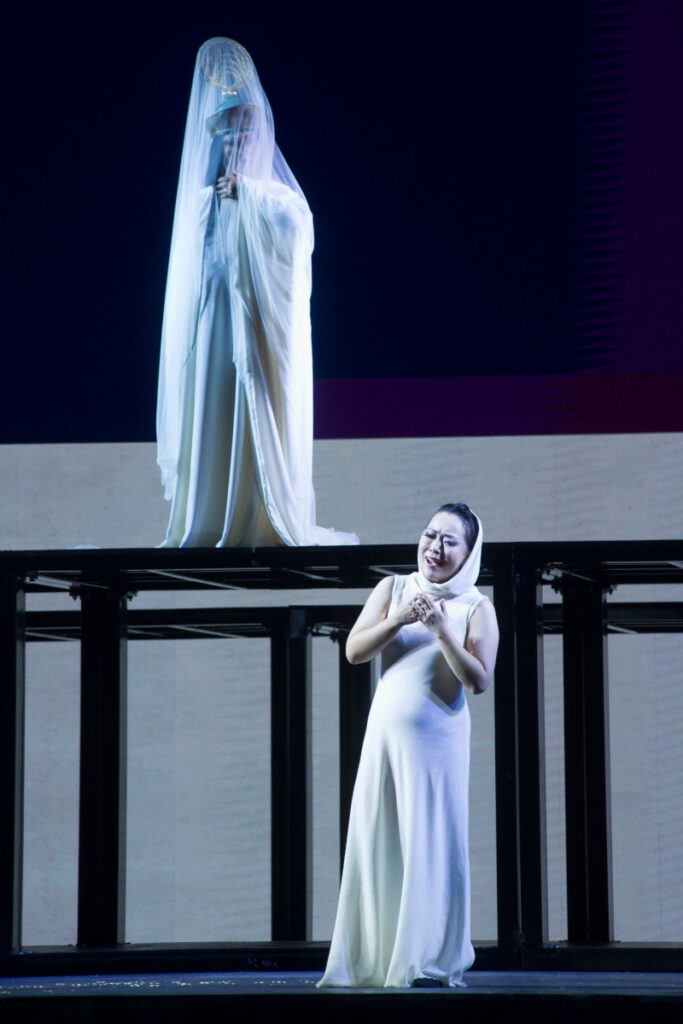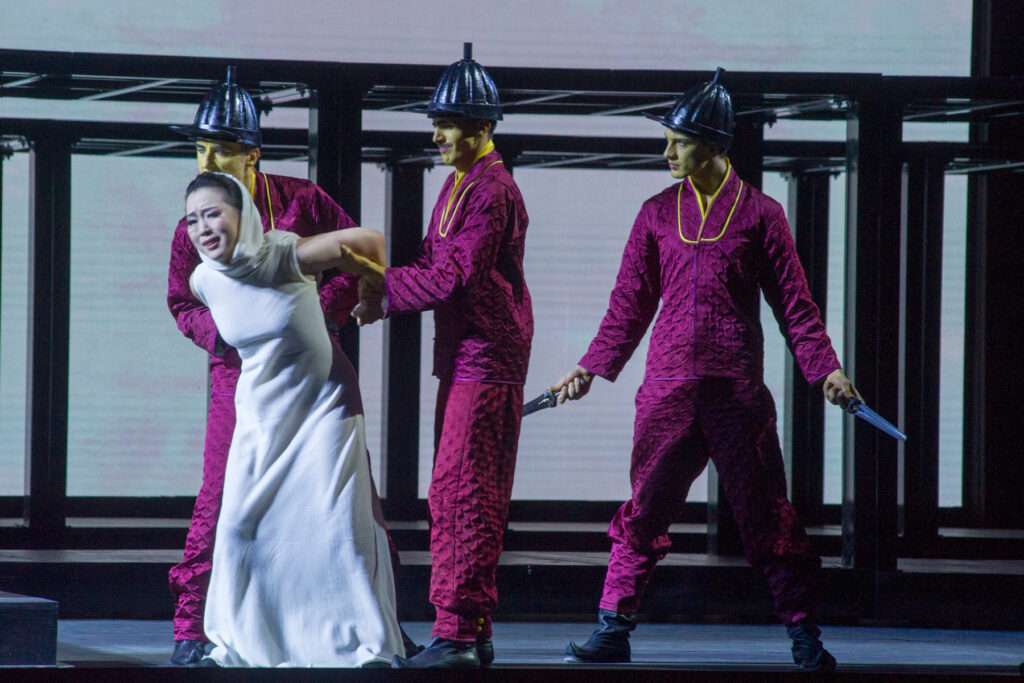2024 is the centenary anniversary of Puccini’s death, and so it makes sense that the prominent festival of the composer’s operas at Torre del Lago (the Tuscan lakeside resort where he lived) should feature Turandot this year – his last opera, that wasn’t quite complete when he died unexpectedly following surgery. Pier Luigi Pizzi’s production draws the connection between these facts more closely and repeats Arturo Toscanini’s stance on the occasion of its first performance at La Scala in 1926, when he put his baton down and ended the performance with the death and funeral procession of Liù, as that is as far as Puccini reached in scoring the opera fully (the rest of the work was only composed in short score or sketched).

As a historical recreation, that is justified this year, and it saves broaching the issue of which completion to use, seeing that critical and practical consensus haven’t yet quite aligned over which version is best. Franco Pulcini’s programme note attempts to justify the decision on the basis that it ‘highlight[s] an archetype of Puccini’s theatre: female suicide’. That archetype has certainly been noted by commentators, and often criticised. This ending also has the effect of significantly, or even fundamentally, shifting the dramatic and emotional focus of the opera, upon Liù’s relationship to Calaf, rather than Turandot’s to him. But it does make for a subdued conclusion – climax is hardly the right word – which feels unsatisfactory (however much it is an intriguing or sound idea in the context of social and gender sensibilities). By not concluding with the expected ending, it leaves the relation between Calaf and Turandot unresolved (even if it’s a fair criticism that Turandot’s change of heart towards him is not very convincing in the libretto). The truncated ending also denies the fact that, for once, one of Puccini’s female suicides doesn’t then become the end point of an opera, to be exploited (indecently or otherwise) for its dramatic potential, such that in some sense, Liù’s death could become absorbed in the eventual triumph of the drama, and perhaps act in some redemptive manner. At the least, the tragic ending we witness might have been given some theatrical flourish – and a clearer cue to us to understand that it was in fact the conclusion – if conductor Renato Palumbo had mimicked Toscanini by relinquishing his baton and reminded us that this is as much as Puccini had composed in full.
That aside, Pizzi’s production in the very particular circumstances of the huge open-air arena at Torre del Lago captivates with its simplicity. The work’s Orientalism is downplayed, if not entirely neutralised, by merging the visual flavour of the characters’ roughly legendary Chinese style costume, with a symbolic, computer-generated backdrop that draws upon the tradition of Italian art. The environment of the palace in Acts One and Three are conjured with a simple white scene against a twilit sky, featuring square columns receding in perspective, ending with a rotunda, clearly evoking the revolution of perspective in Italian (especially Tuscan) Renaissance art, for example as in the painting The Ideal City (at Urbino, once attributed to Piero della Francesca). The three-layered rotunda has the vague appearance of a pagoda, but its circular form also references such a building as the one in the centre of that picture, or Bramante’s pioneering Tempietto in Rome for instance. Such a setting makes for an ironic contrast between the humanism and reason-led discourse of the Renaissance, and the autocratic regime of the Emperor and Turandot, where the latter’s failed suitors can be so casually put to death on the basis of an age-old legend. The full moon in Act Two accurately, and hauntingly, realises the celestial body that is evoked in the text of that section of the opera, against the backdrop of a regal purple-blue sky and dress for the populace.

Chunxi Hu undoubtedly brings the role of Liù centre stage, with an impassioned but tender performance, expressing her compassion for the aged Timur, and calm, unself-interested love for Calaf. Nevertheless, there is still room for an overtly dramatic account of the title character from Anna Pirozzi. That especially comes to the fore in her Act Two aria, when she narrates the backstory of her ancestor’s humiliation, beginning with trepidation and fear, building defiantly to a fearsome, imperious climax.
Amadi Lagha’s Calaf is less secure, strained initially but he warms up as Act One proceeds, and gives as convincing and fervent an account of ‘Nessun dorma’ as any. Andrea Concetti is solemn and resigned, perhaps even inscrutable as his father, the dispossessed ruler of Tartary, Timur. Danilo Pastore is curiously cast as Turandot’s father, the Emperor. His high tenor voice is mellifluous and beguiling on its own terms, but it’s an odd way of realising the role, as he sounds more as though he should be a eunuch courtier rather than embody imperial authority. Pietro Spagnoli, Saverio Pugliese and Luigi Morassi combine well as the ministers Ping, Pang and Pong, exuding humour, but blending finely as a little choral trio, instead of comprising three divergent characters or voices.
The open air is a tricky acoustic to dominate, as the overall timbre becomes somewhat flattened, and initially Palumbo and the Puccini Festival Orchestra adopt a somewhat brusque, clipped delivery of the score to carry it across. But with one of the most extensive and diverse ensembles that Puccini called for in an opera, the performance settles down into a more sustained and consistently urgent interpretation, alongside which the Chorus remain well integrated and personable. Together, all the forces execute a quietly moving conclusion for Liu’s death, making musical sense, at least, of that event as the end of the drama.
Curtis Rogers
Turandot
Composer: Giacomo Puccini
Libretto: Giuseppe Adami and Renato Simoni
Cast and production staff:
Princess Turandot – Anna Pirozzi; The Emperor Altoum – Danilo Pastore; Timur – Andrea Concetti; The Unknown Prince (Calaf) – Amadi Lagha; Liù – Chunxi Hu; Ping – Pietro Spagnoli; Pang – Saverio Pugliese; Pong – Luigi Morassi; A Mandarin – Pietro Spagnoli; Handmaids – Greta Buonamici and Maria Salvini; Prince of Persia – Davide Piaggio
Director, Designer and Costumes – Pier Luigi Pizzi; Choreography – Gheorghe Iancu; Lighting Designer – Massimo Gasparon; Video Designer – Matteo Letizi; Conductor – Renato Palumbo; Coro delle Voci Bianche del Festival Puccini; Puccini Festival Chorus and Orchestra
Puccini Festival, Torre del Lago Puccini, Tuscany, Italy, Saturday 10 August 2024
All photos courtesy of Puccini Festival.